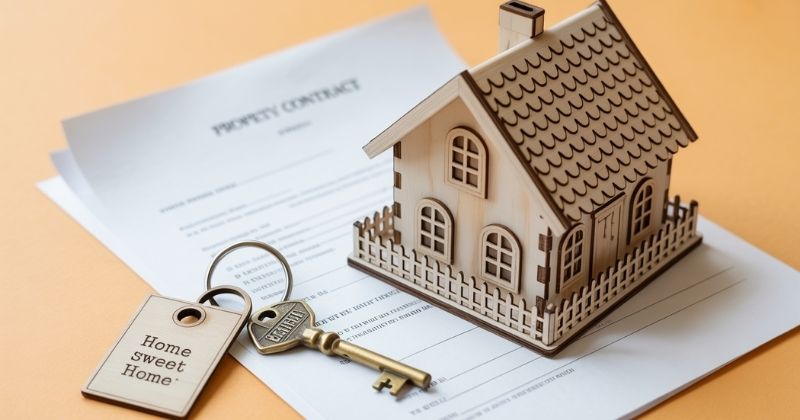
Property ownership in South Africa follows a well-defined legal framework that protects owners’ rights and ensures transparency in all transactions. Whether purchasing a full-title home, a sectional title unit, or acquiring leasehold rights, each type of ownership comes with specific responsibilities and limitations. Understanding the processes involved, from title deeds and legal transfers to the role of conveyancers and the Deeds Office, is key to navigating property ownership in South Africa with clarity and confidence.
Key Takeaways
- Different Types Of Ownership: South Africans can own property through full-title, sectional title, or leasehold arrangements, each offering varying levels of control, cost, and responsibility.
- Deeds Office Access: The Deeds Office provides public access to ownership records, title deeds, and property-related documents, with specific information required to retrieve records.
- Legal Transfer Process: Property transfers are managed by conveyancers, involve legal documentation, and include costs such as transfer duty or VAT, depending on the nature of the sale.
About Arcadia Finance
Arcadia Finance makes borrowing simple. No fees. Just a smooth, secure way to compare 19 registered lenders approved by the National Credit Regulator. Find the right loan for your situation today.
Understanding Property Ownership
Property ownership in South Africa operates within a clearly defined legal structure that safeguards the rights of owners and promotes transparency throughout all property-related transactions. Holding ownership of a property grants specific legal rights and obligations, including the right to live on the property, make use of it, rent it out, or sell it, all in accordance with relevant laws and regulations.

Types Of Property Ownership

Full-Title Ownership
In South Africa, full-title ownership is the most widely used form of property ownership. This means the owner has complete legal control over both the land and any buildings on it. It is particularly suitable for those who want full autonomy and decision-making authority over their property. Owners can choose to renovate, extend, or subdivide the land, subject to municipal regulations.
While full-title ownership offers extensive freedom, it also comes with greater financial and practical responsibility. This type of ownership typically involves higher upfront costs, and the owner is solely responsible for all maintenance, repairs, and upgrades. In many cases, the owner will also need to apply for planning approval or permits before undertaking major structural changes or additions.

Sectional Title Ownership
Sectional title ownership is increasingly common, especially among buyers of flats, apartments, and townhouses. This form of ownership means you legally own a specific unit within a residential development, along with a shared interest in the common areas. These common areas might include parking, walkways, gardens, or recreational facilities such as a swimming pool.
One of the key benefits of sectional title ownership is that costs for maintaining shared spaces are divided among all unit owners. This makes it a more budget-friendly option compared to full-title properties. It is also well-suited to individuals who travel often or prefer a lock-up-and-go lifestyle.
On the other hand, sectional title ownership has its limitations. Owners often have restricted authority to alter their units. Most changes require approval from the Body Corporate, which manages the building or complex. Owners are also expected to pay monthly levies and additional fees, which can increase over time. All residents must also comply with a set of conduct rules established by the scheme.

Leasehold Ownership
Leasehold ownership refers to the legal right to use and occupy a property for a specific term, often up to 99 years. Although you have the right to live in or operate from the property, you do not own the land it stands on. This type of arrangement is often used for commercial or industrial sites, but it is also becoming more common in the residential market.
The main benefit of leasehold ownership is its lower initial cost compared to buying a full-title property. For many first-time buyers, this makes property ownership more accessible. In addition, leaseholders are typically not responsible for major property maintenance, as this usually remains the duty of the landowner or managing party.
However, leaseholders face several constraints. Because the land is not owned by the occupier, they have limited control over its use. Monthly or annual rent is payable to the landowner, and this cost may increase during the lease term. In most cases, leaseholders must also obtain written consent before making structural changes or alterations to the premises.
Key Legal Aspects To Consider
- Title Deeds: The title deed serves as the official legal record that confirms ownership of a property. This document is recorded and maintained by the Deeds Office.
- Transfer Process: The transfer of ownership takes place through a formal legal procedure. This process involves conveyancing attorneys who draft the required documentation and ensure the transfer is properly registered.
- Rates And Taxes: Once you own a property, you are legally responsible for paying all municipal rates and property taxes associated with it. These charges are usually paid to the local municipality.
- Bond Registration: Most property buyers in South Africa make use of a home loan or mortgage, which is secured by registering a bond against the property’s title deed. This gives the bank a legal claim until the loan is repaid.
What Is The Deeds Registration?
The Deeds Registration division operates under the Department of Agriculture, Land Reform and Rural Development. It is responsible for handling the registration of title deeds and legal documents, and for providing access to archived and current registration information.
The Office of the Chief Registrar of Deeds (OCRD) manages a network of 11 deeds registries spread across 9 provinces in South Africa.
The deeds registry is open to the public, and individuals can access a wide range of property-related information, including:
- Details of the current registered owner of a specific property
- Legal provisions or rules that apply to the property
- Interdicts or contractual arrangements involving the property
- The recorded purchase price paid for the property
- Rules associated with a sectional title scheme
- Copies of antenuptial agreements, mortgage bonds, or servitude deeds
- Copies of sectional title plans and rules, although these are only for informational use and not considered certified documents
- Township establishment conditions as they relate to a particular area
- General property or deed-related information
- Tracking details for a deed as it moves through the registration process
Before requesting information from a deeds office, ensure you have the following details prepared:
- The full names, ID number, or date of birth of the property owner
- If the property is owned by a community group or association, provide the registered name and registration number, if available
- The correct ERF number, as well as the name and number of the township or farm. A street address will not be accepted
- For sectional title properties, the specific section number and the scheme name must be provided

The Registration Process
Purchasing a Property
The process of becoming a homeowner begins with identifying a suitable property and then submitting an offer to purchase. After the buyer and seller reach agreement on the purchase price, a formal Offer to Purchase is drafted, typically by the estate agent, outlining the terms and conditions of the sale. In accordance with South African legal requirements, any contract involving the sale of land must be documented in writing and physically signed using wet ink, as electronic signatures are not legally accepted.
Appointment Of A Conveyancer
Once the seller accepts the offer, a conveyancer is appointed to manage the legal aspects of the property transfer. Usually, the seller selects the conveyancer, although in certain cases, the seller may agree to appoint a reliable conveyancer nominated by the buyer. The conveyancer is responsible for compiling all necessary legal documents and submitting them to the Deeds Office for processing. A property search is also conducted at the Deeds Office, during which the conveyancer examines existing title conditions to identify any limitations or restrictions that may impact the property.
Legal Costs And Transfer Duty
The buyer must cover the conveyancer’s professional fees, the Deeds Office charges, and various other disbursements. These disbursements include Transfer Duty, which is a tax paid to the South African Revenue Service (SARS). This tax is calculated based on either the agreed purchase price or the assessed value of the property, whichever amount is greater.
VAT And Developer Sales
Where the seller is a developer registered as a VAT vendor, Transfer Duty is generally not charged. In such instances, the VAT amount is typically included in the total purchase price, and no separate duty is payable.
Lodgement And Final Transfer
Once the documentation is lodged with the Deeds Office, it undergoes a thorough review process by examiners. After the examination has been finalised and everything is found to be in order, the registrar of deeds signs the documents. At this point, legal ownership of the property is officially transferred to the buyer.
Timeline Of The Process
The time required to complete the registration can vary depending on the circumstances, but typically it takes between 6 and 12 weeks from the date the Offer to Purchase is signed to the final registration of ownership.
The Costs Of Property Ownership
Property owners across South Africa must pay municipal rates and taxes based on the official valuation of their property. These charges are used to fund essential local services, including road maintenance, waste collection, street lighting, and the upkeep of public spaces. The exact amount payable depends on the property’s value and its location within a municipal area. Homes in more sought-after suburbs or wealthier neighbourhoods are typically subject to higher rates. These charges should be factored into your ongoing monthly expenses, as they can be a significant financial commitment over time.
Buyers purchasing property within estates, sectional title developments, or managed residential buildings may be required to pay monthly levies to a Homeowners’ Association or Body Corporate. These levies help cover the costs of maintaining shared spaces, security services, and sometimes utilities like water or refuse removal. Levies differ depending on the type of development and amenities offered. For instance, complexes with features such as gyms, pools, or access-controlled gates usually have higher charges. Buyers should request a detailed breakdown of the levies and how they are structured before committing to the purchase.
Ongoing maintenance can be a substantial and recurring cost, especially for properties with features such as gardens, swimming pools, or outdoor entertainment areas. Older homes often require regular upkeep, which might include roof repairs, plumbing work, repainting, and appliance servicing. While newer homes may have lower costs initially, they can still require specialist care for modern features like solar panels or water-saving systems. As a general rule, it is advisable to set aside 1 to 2% of the property’s value each year for maintenance, which helps to avoid large, unexpected repair bills.
Monthly utility costs include electricity, water, refuse removal, and sometimes sewage services. These charges are usually based on usage, and households with larger families or high-consumption habits will likely pay more. In regions where water restrictions apply, this may affect how you manage your household, especially if you have a garden or pool. With ongoing power supply issues and increasing electricity tariffs, many homeowners are turning to backup power systems such as inverters, solar installations, or generators, which come with both upfront costs and ongoing maintenance considerations.
When purchasing a property, buyers must account for transfer duty, which is a government tax applied to properties above a certain threshold. The amount payable increases with the property’s price, making it a significant cost for mid- to high-value homes. In addition, legal and conveyancing fees are charged for processing the transfer of ownership. These are generally paid to the attorney managing the transaction and are calculated as a percentage of the purchase price. It is recommended to obtain a cost estimate early in the buying process to avoid financial surprises.
If you are purchasing property as an investment and intend to rent it out, it is worth considering the fees associated with professional property management services. These companies typically handle day-to-day tasks such as tenant screening, rent collection, and coordinating maintenance or repairs. In South Africa, management fees usually range from 8 to 12% of the monthly rental income, depending on the level of involvement and support provided.
Beyond the obvious expenses, there are several less visible costs that may also apply:
- Rates Clearance Certificate: Required by law during property transfers. Though relatively minor, it must be obtained before registration.
- Special Levies Or Assessments: Complexes or estates may occasionally raise additional levies for large repairs, infrastructure upgrades, or emergency projects.
- Security Costs: Many homeowners choose to install alarm systems, electric fencing, or subscribe to armed response services, all of which contribute to monthly costs.
These hidden expenses should be included in your budgeting process to ensure you are financially prepared for property ownership over the long term.
Conclusion
Property ownership in South Africa is governed by a well-established legal framework that ensures clarity, accountability, and secure transfer of ownership. Whether opting for full-title, sectional title, or leasehold, each structure has specific advantages and limitations that buyers must consider. The deeds registration process, managed by the Deeds Office, plays a central role in confirming and tracking property ownership. Understanding the legal, financial, and procedural steps involved in property transfers is vital for all prospective homeowners, especially when navigating costs such as transfer duty, bond registration, and municipal rates.
Frequently Asked Questions
Full-title ownership means the individual owns both the land and the buildings on it. The owner has full legal control over the property but is solely responsible for maintenance, rates, and compliance with municipal regulations.
Sectional title ownership grants the owner rights to a specific unit within a development and shared use of common areas. Leasehold ownership, on the other hand, gives the right to use a property for a set term, usually up to 99 years, without owning the land itself.
To access property records, you must provide details such as the owner’s full name or ID number, the correct ERF and township name, or the section and scheme name for sectional title properties. A street address is not sufficient.
In most cases, the seller appoints the conveyancer to manage the legal transfer process. However, the parties may agree for the buyer to choose the conveyancer if both sides consent.
The process generally takes between 6 and 12 weeks from the signing of the Offer to Purchase to the final registration, depending on the complexity of the transaction and processing time at the Deeds Office.
Fast, uncomplicated, and trustworthy loan comparisons
At Arcadia Finance, you can compare loan offers from multiple lenders with no obligation and free of charge. Get a clear overview of your options and choose the best deal for you.
Fill out our form today to easily compare interest rates from 19 banks and find the right loan for you.




